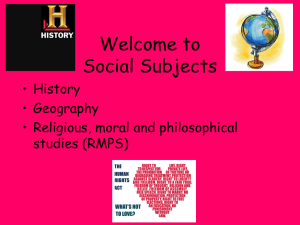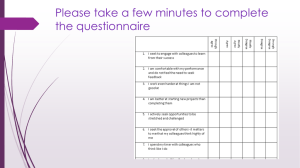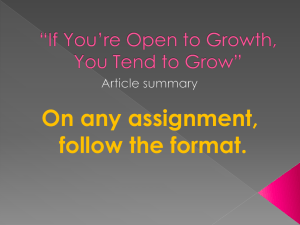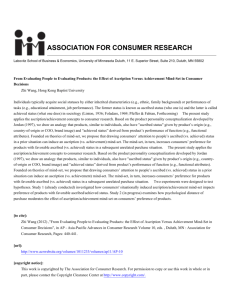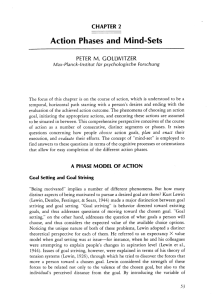Modelling a Growth - Mindset
advertisement
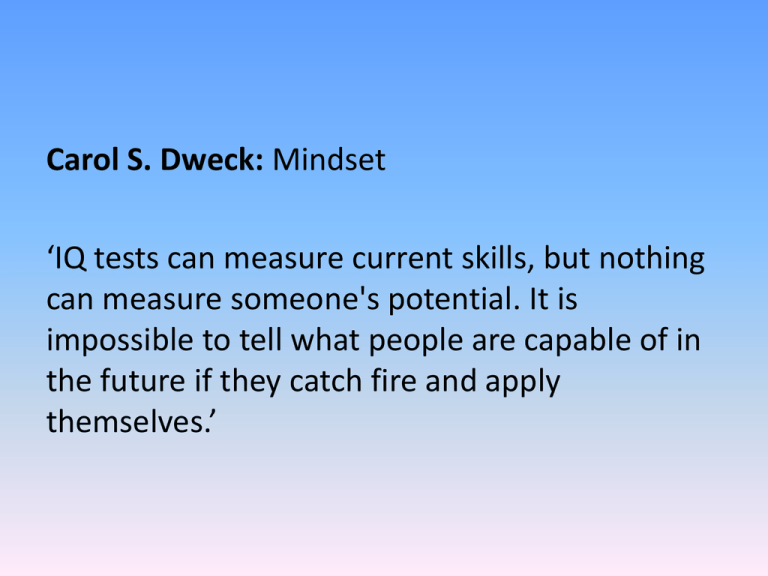
Carol S. Dweck: Mindset ‘IQ tests can measure current skills, but nothing can measure someone's potential. It is impossible to tell what people are capable of in the future if they catch fire and apply themselves.’ Motivation is often more important than your initial ability in determining whether you succeed in the long run. Many creative geniuses were not born that way. They were often fairly ordinary people who became extraordinarily motivated.’ ‘Motivation, is not only the desire to achieve but also the love of learning, the love of challenge, and the ability to thrive on obstacles. Believe that talents can be developed and great abilities can be built over time. Are fearful of making mistakes Think about how they learn Believe that talent alone creates success Well behaved pupils Reluctant to take on challenges Resilient Prefer to stay in their comfort zone View mistakes as an opportunity to develop Believe that effort creates success Higher Ability Pupils Think it is important to ‘look’ smart in front of others Believe that talents and abilities are set in stone, you either have them or you don’t. Lower Ability Pupils Hard Working Pupils Growth Mind-set Fixed Mind-set Believe that talents can be developed and great abilities can be built over time. View mistakes as an opportunity to Growth develop Mind-Set Resilient Believe that talent alone creates success Well behaved pupils Higher Ability Pupils Hard Working Pupils Lower Ability Pupils Believe that effort creates success Think about how they learn Reluctant to take on challenges Prefer to stay in their comfort zone Are fearful of making mistakes Fixed Mind-Set Think it is important to ‘look’ smart in front of others Believe that talents and abilities are set in stone, you either have them or you don’t. Modelling a Growth - Mindset Show students how to recognize fixed mind-set thoughts, how to stop them, and how to replace them with growth mind-set thoughts. When a fixed mind-set thought is spoken aloud in your class ask the student to rephrase the idea as a growth mind-set thought, by doing so you will help students recognize fixed mind-set thoughts. You will also help students monitor each other and shift their thoughts toward growth. What growth mindset phrases could you suggest to students to rephrase their fixed mindset phrases? Do Say Don't Say I'm so stupid. I'm awesome at this. I just can’t do Maths. This is too hard. She / He’s so smart, I wish I was as smart. My answer is fine the way it is. Looking at examples and the mark scheme won’t make my work any better. I just want to know what level / grade I got. Do Say Don't Say What am I missing? I'm so stupid. I seem to be on the right track. I'm awesome at this. I’m going to train my brain in Maths. I just can’t do Maths. This is going to take some time. This is too hard. I’m going to work out how he / she’s doing it. She / He’s so smart, I wish I was as smart. What can I do to improve? My answer is fine the way it is. That’s an interesting idea for improvement. How can I use that in my work? Looking at examples and the mark scheme won’t make my work any better. I just want to know what level / grade I got. Promotes a Fixed Mind Set Promotes a Growth Mind-Set Praising pupils for being smart Praising effort and strategies Formative comments that emphasis achievement Formative comments that emphasis effort and application Praising students for achievements that come easily Building robust self confidence Spending time documenting intelligence and ability Spending time developing intelligence and ability Directing pupils to which tasks to complete Giving pupils a strong voice in the learning process and a sense of purpose Boosting self esteem Providing constructive criticism Place importance on grades / levels rather than learning Place importance on learning rather than grades / levels What strategies could you use in your teaching practice to promote a growth mindset? Promotes a Growth Mind-Set Promotes a Fixed Mind-Set Praising pupils for being smart Formative comments that emphasis achievement Praising students for achievements that come easily Spending time documenting intelligence and ability Directing pupils to which tasks to complete Placing importance on grades / levels rather than learning Promotes a Growth Mind-Set Promotes a Fixed Mind-Set Praising effort and strategies Praising pupils for being smart Formative comments that emphasis effort and application Formative comments that emphasis achievement Building robust self confidence Praising students for achievements that come easily Spending time developing intelligence and ability Spending time documenting intelligence and ability Giving pupils a strong voice in the learning process and a sense of purpose Directing pupils to which tasks to complete Providing constructive criticism Placing importance on grades / levels rather than learning Place importance on learning rather than grades / levels 'Meaningful learning tasks give students a clear sense of progress leading to mastery. This means that students can see themselves doing tasks they couldn't do before and understanding concepts they couldn't understand before. Work that gives students a sense of improvement as a result of effort gives teachers an opportunity to praise students for their process. That is, teachers can point out that the students' efforts were what led to the progress and improvement over time.' (Dweck 2010) Sharing Strategies How do you make progress visible to your students?






